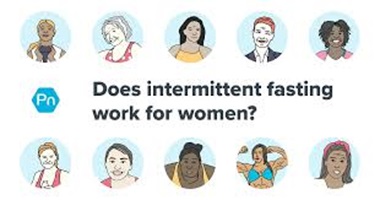Intermittent Fasting and Women: Essential Considerations
Intermittent Fasting and Women: Essential Considerations Please watch >>>
Intermittent fasting (IF) can offer various health benefits, but women should be particularly mindful of certain considerations before starting:

What is intermittent fasting? Intermittent Fasting Overview
Intermittent fasting (IF) focuses on when you eat, rather than the specific foods you consume. It involves alternating between periods of eating and fasting.
Different Approaches to Intermittent Fasting
- Twice-a-Week Method (5:2)
- Eat a normal, healthy diet for 5 days a week.
- On the other 2 days, consume no more than 500-800 calories.
- Choose fasting days with at least 1 non-fasting day between them.
- Alternate-Day Fasting
- Fast every other day.
- On fasting days, limit intake to 500-800 calories.
- On non-fasting days, eat a normal, healthy diet.
- Time-Restricted Eating
- Separate eating and fasting into specific windows within a day.
- Extend the natural fasting period that occurs during sleep.
- Common methods include:
16/8 Method: Fast for 16 hours, and eat during the remaining 8 hours (e.g., eating between 9 a.m. and 5 p.m. or noon and 8 p.m.).
14/10 Method: Fast for 14 hours, and eat during the remaining 10 hours (e.g., eating between 10 a.m. and 8 p.m.).
18/6 and 20/4 Variants: More restrictive versions with longer fasting periods and shorter eating windows.
How Intermittent Fasting Works
Intermittent fasting (IF) is an eating pattern where you cycle between periods of eating and fasting. Here’s how it generally works:
- Fasting Periods: During IF, you alternate between periods of eating and fasting. Common methods include the 16/8 method (fasting for 16 hours, eating within an 8-hour window), the 5:2 method (eating normally for 5 days, restricting calories for 2 non-consecutive days), or alternate-day fasting.
- Metabolic Changes: When you fast, especially for longer periods (12 hours or more), several things happen in your body:
Insulin Levels: Decrease, which helps facilitate fat burning.
Cellular Repair: Your cells initiate repair processes, such as autophagy (where cells digest and remove old or dysfunctional proteins that build up inside cells).
Hormone Regulation: Human Growth Hormone (HGH) levels increase, which aids fat loss and muscle gain.
- Caloric Restriction: IF often leads to reduced calorie intake, which can contribute to weight loss over time, though this isn’t the only mechanism at play.
- Health Benefits: Studies suggest that intermittent fasting may offer several health benefits, including improved insulin sensitivity, better heart health, and potentially even longevity benefits in animal studies.
- Personalization: The effectiveness of IF can vary among individuals, and it’s important to find a fasting schedule that suits your lifestyle and health goals.
Key Considerations for Women
- Hormonal Balance:
I can impact women’s hormones differently than men’s. A gradual approach can help mitigate potential disruptions to menstrual cycles and reproductive health.
Sudden changes in eating patterns may affect estrogen levels and lead to menstrual irregularities.
- Bone Health:
Adequate nutrient intake is crucial for maintaining bone health. Ensure you’re consuming enough calcium and vitamin D, especially during eating windows.
- Metabolic Health:
Women might experience changes in metabolism differently. Monitor blood sugar levels, especially if you have conditions like PCOS or thyroid disorders.
- Reproductive Health:
Pregnant or breastfeeding women should avoid IF due to increased nutritional needs during these periods.
Consult with a healthcare provider if trying to conceive or if experiencing menstrual irregularities.
- Medical Conditions:
Women with diabetes or those on certain medications should consult their doctor before starting IF. Medications may need adjustment to prevent hypoglycemia or other complications.
- Nutrient Intake:
Focus on nutrient-dense foods during eating periods to ensure you meet your body’s needs for vitamins, minerals, and overall energy.
Avoid the temptation to overeat or choose less healthy options during eating windows.
- Gradual Introduction:
Start with shorter fasting periods and gradually increase duration to allow your body to adjust. For instance, begin with a 12-hour fast and slowly extend it.
- Listening to Your Body:
Pay attention to how your body responds. If you feel tired, dizzy, or experience other negative symptoms, adjust your fasting plan accordingly.
Benefits of Intermittent Fasting for Women
While the long-term effects of intermittent fasting (IF) are still being studied, there is evidence of several short-term health benefits for women, including weight loss, improved heart health, and reduced risk of diabetes.
- Weight Management:
I can help with weight loss and management by reducing calorie intake and improving metabolism.
- Improved Insulin Sensitivity:
IF may enhance insulin sensitivity, potentially reducing the risk of type 2 diabetes.
- Heart Health:
Some studies suggest that IF can improve markers of heart health, including cholesterol levels and blood pressure.
Personalized Nutrition
Gut Health: Individual responses to foods can vary, impacting gut microbiome composition and overall health.
Personalized Plans: Tailoring your nutrition based on personal responses can optimize health outcomes.
Why Is Intermittent Fasting Different For Women And Men?
Intermittent fasting (IF) affects men and women differently. Women need to be aware of possible risks related to reproductive health, bone health, and overall well-being.
Potential Risks for Women
- Reproductive Health: IF may lead to reduced calorie intake, which can affect energy availability. When energy is limited, the body prioritizes survival functions over reproductive functions.
Studies on rodents suggest IF may alter estrogen levels and negatively impact menstrual regularity, fertility, pregnancy, and lactation.
Male rodents also experience hormonal changes, but these do not significantly affect their reproductive functions compared to females.
- Energy Requirements:
Pregnancy and breastfeeding require more energy, which might be compromised with low-calorie intake.
It’s unclear if human females are affected in the same way as rodent females, but caution is advised.
- Bone Health:
Limited calorie intake could reduce bone strength and density.
A recent review suggests IF does not impact bone mineral density like calorie-restricted diets, but most studies are small, necessitating further research.
- Other Side Effects:
Possible side effects include headaches, tiredness, constipation, and overeating during non-fasting periods.
Managing Health Risks
Gradual Approach:
Women may benefit from making small, gradual changes over several months rather than drastic changes in a short period.
Consulting a Doctor:
Before starting IF, discuss potential risks with your doctor to determine if it’s right for you.

Conclusion
Women considering intermittent fasting should be mindful of these potential risks and approach IF cautiously.
Consulting with a healthcare professional can help tailor a fasting plan that supports overall health and well-being.
Stay Hydrated: Drink plenty of water, especially during fasting periods.
Balance: Ensure your diet is balanced and includes a variety of food groups for comprehensive nutrient intake.
By considering these factors, women can approach intermittent fasting in a way that supports their health and well-being.


